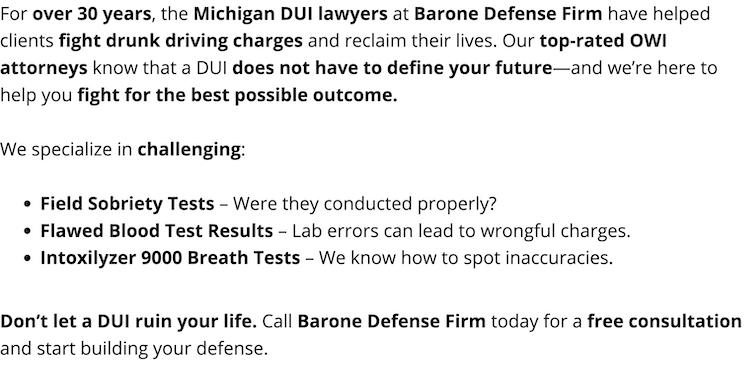DUI Treatment
Research indicates that the probability that a person has an alcohol disorder, of which there are different types, increases according to the number of drunk driving arrests the person has had. One drunk driving arrest in and of itself does not necessarily reveal to the world or the professional psychological community that you are an "alcoholic."
The courts, on the other hand, may assume that even one arrest means you are an "alcoholic." Consequently, you and your psychologist must work together to help the court see that you are not a danger to society and that your alcohol problems, if any, are "fixable." As such it is important to consult with a Michigan DUI lawyer who can discuss what penalties you may be facing and help determine what course of treatment may be most beneficial to you and your case.
Alcohol Disorders
Professionals who evaluate and treat alcohol disorders assess multiple dimensions of the person's drinking behavior in a sophisticated evaluation process using research-based tests and interviews before arriving at a definitive conclusion about the person's relationship with alcohol. Furthermore, there are different types of alcohol disorders, not one huge wastebasket diagnosis that everyone belongs to called "Alcoholic." The real diagnostic categories of alcohol-related problems primarily fall under two camps.
The first is classified as "Alcohol Abuse," and this disorder, according to our diagnostic nosology called the "Diagnostic and Statistic Manual for Mental Disorders or DSM" simply put occurs when people drink more alcohol that they intended and because of their drinking patterns, they start to face consequences in certain areas of their lives, such as in the employment, financial, social or legal arenas. A large percentage of folks who fall into this category are the occasional or regular "binge" drinkers, who may not drink on a daily basis, but nevertheless, find themselves in proverbial "hot water" when drinking (such is the case with a drunk driving arrest.)
Of course, there are degrees of severity within the Alcohol Abuse disorder, ranging from never arrested to a first arrest, to repeated arrests, although the number of arrests is not the main criteria we use for making the diagnosis or gauging its severity. Treatment recommendations for this diagnostic camp range from no treatment to support group or individual therapy recommendations.
The second diagnostic category is Alcohol Dependence, which includes the criteria from the Alcohol Abuse family, but adds that the person has developed tolerance (i.e., needs more and more of the drug to achieve a high) and withdrawal symptoms. Treatment recommendations for Alcohol Dependence usually involve inpatient treatment or detoxification to assist the person with the physical dependence factors of the alcohol.
Evaluation
It is to your benefit to be perfectly honest to the psychologist during your evaluation. A well-trained Ph.D. level psychologist has years of experience evaluating these disorders and will most likely know from clinical data or test measures when a person is fabricating or denying the truth about a drinking problem. Even more importantly, however, is the fact that the psychologist is on your side. Psychologists are trained as problem-solvers and supporters. A typical psychologist will be motivated to properly diagnose your drinking problem not because he or she wants to shame or judge you, or simply to help you with your court case.
The psychologist is well-aware that you are probably full of shame and anxiety already from your arrest ordeal and that you are already, whether you are aware of it or not, contemplating whether you have a problem with your alcohol use. A good psychologist will, in a non-judgmental way evaluate your problem and working together with you, formulate an appropriate treatment plan that will be aimed at relieving you from that which is causing you pain and consequences.
Your denial or minimization of an alcohol problem, if present, is not going to help you to be happy. Sometimes, the person in question was simply intoxicated while driving, and requires some debriefing about the effects of using alcohol in a cavalier way, or just a place to vent about the traumatic legal ordeal; other times, a person will require assistance from a well-trained professional to find knowledgeable guidance and support in handling stress.
In any event, a meeting with a alcohol-specialist psychologist can only be a good thing. If you follow the recommendations of the psychologist, it can lead to a positive influence in your court case as well, as it will show the court that you are motivated to change. The court most likely will see you as a person needing alcohol rehabilitation, and working with a psychologist will provide the court evidence that you are taking your offense seriously and are sincere in trying mend your ways.
DUI Treatment
There are many ways to treat an alcohol abuse problem and psychologists do not believe that "one size fits all" when it comes to alcohol diagnosis and treatment. Consequently, it will be important for your professional to develop an individualized treatment plan that is specific to the needs of the client. For alcohol abuse and dependence situations, we will often refer the person to either outpatient psychological counseling, AA or similar group, or inpatient rehabilitation (the latter only pertaining to significant alcohol dependence conditions). Occasionally, the client will have a preference for individual therapy or AA and this can be honored usually with no problem.
Oftentimes, the court will order treatment, and the therapist can facilitate this process by either starting therapy with the client, or referring the client to another therapist or support group. The psychologist can also recommend to the court that no treatment at all is warranted for an appropriate client.
If you do require treatment, this will usually involve cognitive behavioral, relapse-prevention therapy techniques. This approached is a scientifically-developed method that educates the client to the risk factors for that particular client to repeated unwanted alcohol-related behavior by identifying triggering thoughts, people, places or events that result in drinking or unlawful behavior.
This work together may involve charting moods and drinking urges, and may involve identifying and fixing problems increasing the client's desire to drink. If a client also chooses to work with AA at this time, the psychologist will support the 12-step process of alcohol reform, so long as this method makes sense for the client.
Sometimes, in rarer cases, the psychologist will make a recommendation that the person consider a psychiatric evaluation for medication to use while in treatment to assist with mood or chemical abuse problems. Overall, the goal of treatment is to use the research-based techniques and treatments that work best for each individual client's successful outcome.
 Barone Defense Firm Home
Barone Defense Firm Home
















